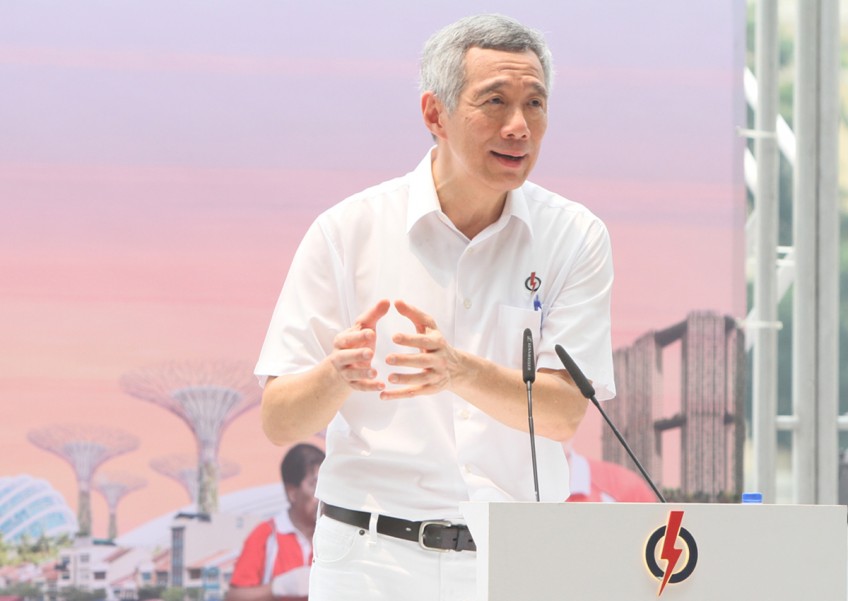The PAP's urgent succession dilemma


There was a moment during Mr Lee Hsien Loong's rally speech at UOB Plaza yesterday when it hit home to me why the People's Action Party (PAP) has been hammering away at the message about the need for renewal.
Craning my neck, looking over the shoulders of those in front, I caught a glimpse of Mr Lee's head crowned with grey. He was talking about entering politics in 1984, and speaking at the traditional general election rally in the financial district since. The rally used to be at Fullerton Square but moved in 1996 to UOB Plaza.
Mr Lee drew laughs and applause often as he spoke. He told stories of a hawker he had met in Hokkaido in Japan and then at Serangoon Gardens market, and of a rainbow photo he shared that drew 55,000 Facebook likes - "better than a rally speech", he noted wryly.
He was in good form .
But stripped of the stories and political comebacks, his message was a dead serious one: Singapore needs good people to be in politics.
And he needs the support of voters at this election, to vote in a team of people who can then take time to forge a bond with people and work together towards a better future. It takes time for political leaders to find their own voice and way, and longer still to forge a bond with the people.
Listening to him, I thought Mr Lee could have been speaking about himself. It has taken him three decades to get to where he is today and, at 63, it is time to groom a successor. No wonder he is in a mighty hurry to get in place a team from which a successor might emerge. Where he is today, is a political leader at ease with himself and his people. He has come a long way from the geeky son of then Prime Minister Lee Kuan Yew who became Teck Ghee MP in 1984. He took over from Mr Goh Chok Tong as PM in 2004 amid talk of an "image problem" as someone stern and forbidding. In 2006, at UOB Plaza, in the heat of the hustings, he spoke about "fixing" the opposition. In 2011, at the same venue, he shocked many - in a good way - by apologising for his government's mistakes.
This General Election 2015 rally speech might be remembered in the future as the one where Mr Lee turned the opposition's argument on its head. To the opposition claim that it made sense to vote for them to make the PAP work harder, he said this was "perverse" and the correct argument was this: "Opposition not working hard enough, they make a mess of things, they are not active enough in Parliament, they are really talking not much sense - vote PAP, make the opposition work harder."
Mr Lee spoke passionately in English, with dialects and Singlish thrown into the mix. When he speaks of the Government's commitment to keeping Singapore safe, and rallying them to work together so the country can succeed, one senses his personal determination to the cause.
The worry in his mind is whether there will be a successor team to take over. He named current leaders in Cabinet: Heng Swee Keat, Lawrence Wong, Chan Chun Sing, Tan Chuan-Jin. He named new candidates Ng Chee Meng, Ong Ye Kung and Chee Hong Tat.
He described them as "people with potential" who he hopes to see get elected and asked for voters' support. And if elected, these men need to "show their commitment and prove themselves". And in due course, they "will be able to form that bond with you, with your children", he said.
The key words are: in due course.
Relationships take time to build, and politics is about the relationship between politicians and voters. This explains Mr Lee's sense of urgency to get a team in place to choose Cabinet leaders from. But while political parties can do their best to recruit candidates, it is up to voters to endorse their choices. And if they do not, then Mr Lee's succession plans for the PAP - and Singapore - go awry.
The situation this year is more difficult for the PAP than in past elections. This is because the PAP can no longer claim a monopoly on political talent. The new candidates joining opposition parties have strong credentials. Some have made personal or professional sacrifices to enter politics. Most of all, a good number have passion and zeal.
On the other hand, the PAP argues that a dominant yet caring PAP is Singapore's best bet for success. It has been able to attract qualified people to step up to stand for election. But will they be able to win voters over with their passion and commitment? Or will voters see some as candidates simply moving up from their public sector posts to take up political office? For decades, the PAP's succession plan became the country's succession plan. The leaders it picked went on to lead the country. But that is no longer guaranteed.
The succession dilemma today is that even the PAP cannot know, and only history will reveal, whether the team to lead Singapore into the future will come from it or from another party.
So while Mr Lee is understandably concerned about electing the PAP slate into Parliament, I think it is equally important that voters raise the bar for the opposition.
The quality of opposition candidates will soon matter as much as the quality of the PAP candidates: Because in all likelihood, one of them, if not in this general election, then perhaps the next, or the next, could become Singapore's future PM.
muihoong@sph.com.sg

This article was first published on September 9, 2015.
Get a copy of The Straits Times or go to straitstimes.com for more stories.